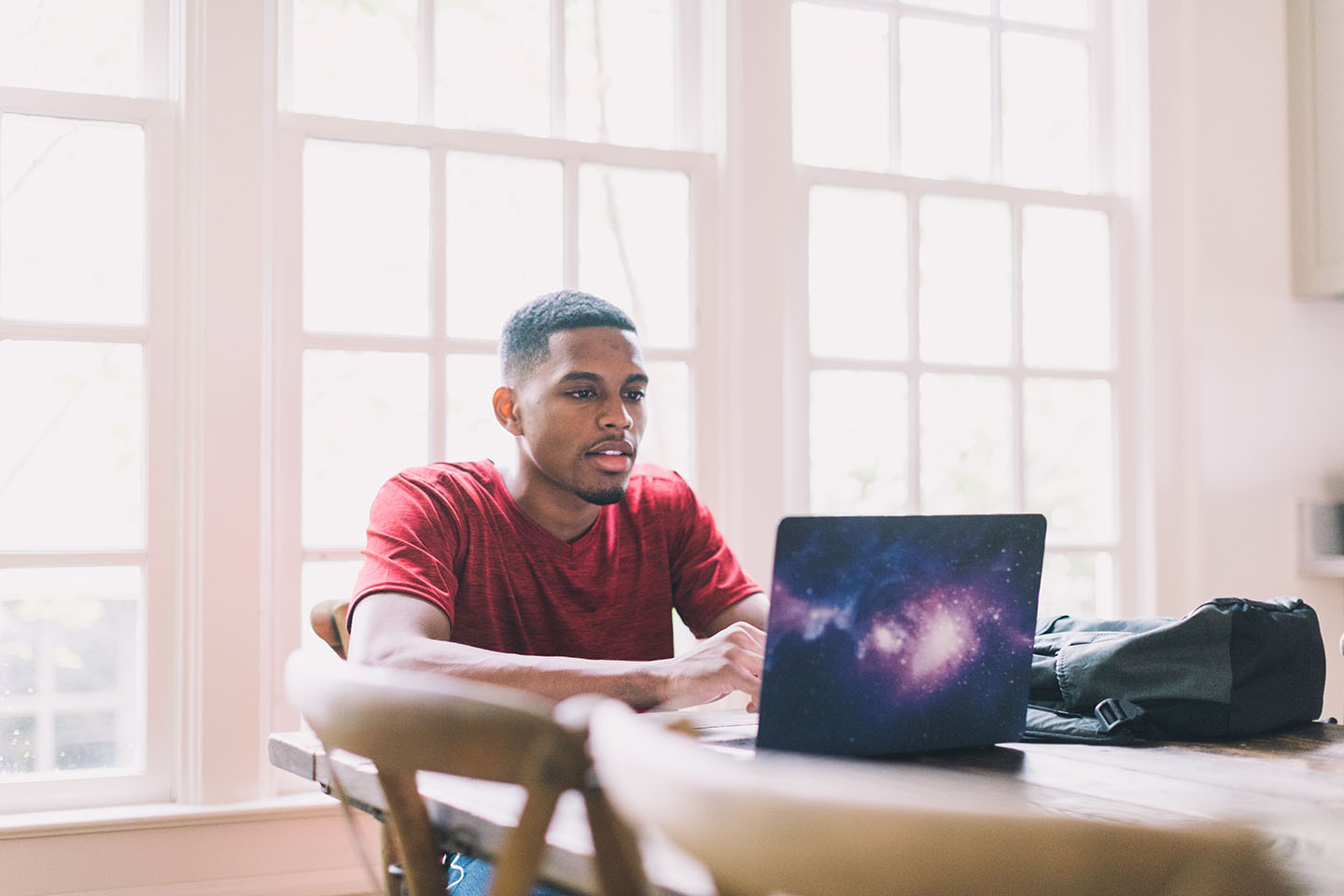Georgia State University junior Malachi Moultrie decided to study law in his first year of college when he learned about the rate of wrongful convictions in the U.S.
“That’s when I was like, okay, someone needs to step forward,” Moultrie says, rattling off data from The Innocence Project that 1 percent of the current prison population have been falsely convicted, and from The National Registry of Exonerations that Black people are much more likely to be wrongfully convicted.
“Someone needs to take a stand and be good representation for these people,” he says. “And I thought to myself, well, why not me?”
Until Spring 2020, Moultrie’s progress toward becoming a lawyer had been going according to plan. He is majoring in criminal justice with a concentration in legal studies, and he has formed many connections through the Phi Alpha Delta Law Fraternity, International, polishing interview skills and working through the LSAT prep books his fraternity brothers recommend.
That network of older peer mentors is still there for Moultrie, but he hasn’t been able to meet with them in person in months because of the COVID-19 pandemic. And, though texting and online meetings are a workable substitute, they aren’t quite second nature. Moultie is learning during the coronavirus crisis how much he prefers in-person interaction.
“I can still do this.”
In the Fall 2020 semester Moultrie is taking three classes online and a fourth class in a blended format where he attends one day a week in a classroom with peers who are all masked and sitting four desks apart.
That blended format, so far, is his favorite, and he wishes more of his classes used it. Because Moultrie feels he does best in face-to-face settings, the switch to online learning during the Spring 2020 semester was difficult at first.
“I was a little nervous,” he says. “I didn’t know how I would function in that type of environment because I’ve never done anything like that before. It took a good week for me to actually adapt to ‘okay, we’re online. I can still do this.’”
Remote doesn’t have to mean no contact
Moultrie doesn’t absolutely object to online classes and enjoys the comfort of doing some work from his dorm room, but he still struggles with not being able to see his instructors. Some of his remote classes are entirely asynchronous, without lectures where he can see the instructor’s gestures and ask questions. He wants more online class meetings in Zoom or WebEx, so teachers can present material rather than just sending out reading assignments, exams, and written responses to homework.
“I feel like every professor needs to understand that even though we are online, we need to see each other,” he says. “It’s very hard to learn by yourself. Some, like me, just need all their senses to fully grasp the material.”
Many of Moultrie’s friends have dropped classes this semester because of pandemic-related stress and overwork, and he thinks if students were able to socialize, some of that stress might be relieved. He’d like to see more safe campus events to help students socialize safely.
He lives in a GSU dorm with a roommate. “I feel like we’re all kind of caged in and boxed in right now,” he says.
“I’ve seen a few events on campus, where we have a movie night, all watching a movie, whether it’s via Zoom or in a spaced-out area. I like events like that because it shows that the university’s there with us. They know it’s a difficult time. It’s very complex. But they’re trying to make the best of it, and hopefully together we can all get through it.”
Shifting mindset
Moultrie has always been a diligent student who always attends class, gets assignments in on time, and has been earning A grades. But when the sudden shift to online learning happened for Moultrie in Spring 2020, he realized something about his own perceptions was holding him back.
He had a tendency at first to treat the online versions of his classes as optional. After all, everything else he does online, such as connecting with friends on social media, is a leisure activity.
That unfamiliar feeling about a class shocked Moultrie, and he says “I have to keep reminding myself, no, it’s not optional. It’s necessary.”
Moultrie is certain he’s not the only student struggling with that cognitive dissonance about learning online. The interfaces are similar to social media, but the mindsets required are very different, he points out. Social media encourages mindless scrolling, and class requires students to be present. But they are delivered on the same devices.
“People in my age group simply are always on their phones, on Instagram, TikTok, and Snapchat,” he says. “We can open and close out of them anytime, where in a class we have to sit down for an hour.”
Despite the distractions and isolation, Moultrie feels there has been one positive about the pandemic. “It’s given me a little more time to realize what my goal is and how to achieve that goal,” he says.
“That requires me to actually study my cases and learn how to brief cases. I’m doing more schoolwork and making sure my GPA doesn’t falter. It’s pretty high right now with a 3.72. I’m just going to make sure it keeps going.”


